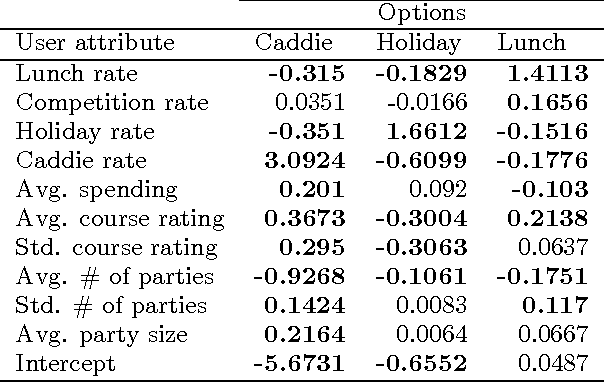Robin Swezey
Recommending Short-lived Dynamic Packages for Golf Booking Services
Mar 13, 2021



Abstract:We introduce an approach to recommending short-lived dynamic packages for golf booking services. Two challenges are addressed in this work. The first is the short life of the items, which puts the system in a state of a permanent cold start. The second is the uninformative nature of the package attributes, which makes clustering or figuring latent packages challenging. Although such settings are fairly pervasive, they have not been studied in traditional recommendation research, and there is thus a call for original approaches for recommender systems. In this paper, we introduce a hybrid method that leverages user analysis and its relation to the packages, as well as package pricing and environmental analysis, and traditional collaborative filtering. The proposed approach achieved appreciable improvement in precision compared with baselines.
Large-scale Recommendation for Portfolio Optimization
Mar 13, 2021



Abstract:Individual investors are now massively using online brokers to trade stocks with convenient interfaces and low fees, albeit losing the advice and personalization traditionally provided by full-service brokers. We frame the problem faced by online brokers of replicating this level of service in a low-cost and automated manner for a very large number of users. Because of the care required in recommending financial products, we focus on a risk-management approach tailored to each user's portfolio and risk profile. We show that our hybrid approach, based on Modern Portfolio Theory and Collaborative Filtering, provides a sound and effective solution. The method is applicable to stocks as well as other financial assets, and can be easily combined with various financial forecasting models. We validate our proposal by comparing it with several baselines in a domain expert-based study.
PiRank: Learning To Rank via Differentiable Sorting
Dec 12, 2020



Abstract:A key challenge with machine learning approaches for ranking is the gap between the performance metrics of interest and the surrogate loss functions that can be optimized with gradient-based methods. This gap arises because ranking metrics typically involve a sorting operation which is not differentiable w.r.t. the model parameters. Prior works have proposed surrogates that are loosely related to ranking metrics or simple smoothed versions thereof. We propose PiRank, a new class of differentiable surrogates for ranking, which employ a continuous, temperature-controlled relaxation to the sorting operator. We show that PiRank exactly recovers the desired metrics in the limit of zero temperature and scales favorably with the problem size, both in theory and practice. Empirically, we demonstrate that PiRank significantly improves over existing approaches on publicly available internet-scale learning-to-rank benchmarks.
 Add to Chrome
Add to Chrome Add to Firefox
Add to Firefox Add to Edge
Add to Edge